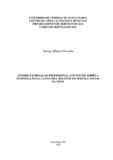| dc.contributor.advisor | Fonseca, Laura Regina da Silva Câmara Maurício da | |
| dc.creator | Noronha, Karopy Ribeiro | |
| dc.date.accessioned | 2020-07-08T09:17:43Z | |
| dc.date.available | 2020-07-08T09:17:43Z | |
| dc.date.issued | 2019-12-03 | |
| dc.date.submitted | 2019 | |
| dc.identifier.citation | NORONHA, K. R. Gênero e formação profissional: um estudo sobre a feminização da categoria discente do serviço social da UFSM. 2019. 63 p. Trabalho de Conclusão de Curso (Graduação em Serviço Social) - Universidade Federal de Santa Maria, Santa Maria, RS, 2019. | por |
| dc.identifier.uri | http://repositorio.ufsm.br/handle/1/19910 | |
| dc.description | Trabalho de conclusão de curso (graduação) - Universidade Federal de Santa Maria, Centro de Ciências Sociais e Humanas, Curso de Graduação em Serviço Social, RS, 2019. | |
| dc.description.abstract | This work of course conclusion, which is presented here, has the general objective to understand the aspects that configure the profile of the student category, and, later in the professional category, Social Services, mostly female. The awakening to the theme took place from the attentive reading of the research carried out in the Social Service course of the Federal University of Santa Maria (UFSM), in 2017, which demonstrated socioeconomic aspects of/Social Service students, Among them, the still striking profile of women in the course, and in addition, identified the reality experienced by the students. In this sense, it was decided to build a reflection that contemplates the particularities of the genesis of the profession in Brazil, and its conservative history, with the modifications of capital on women‟s integration into the productive sphere. The study sought to relate the data from the research “Socioeconomic profile of/the Social Services Students of UFSM”, with the survey constructed in the analysis of the Gender and Work category. It is a research focused on the theoretical-bibliographic review, which prioritizes the qualitative approach and which is based on dialectic historical materialism. Thus, it was verified that the modifications arising from the modus operandi of Capitalism, configured the female work being an extension of the work developed in the private sphere, implying in the inclination of women to professions historically linked to care. However, with the transformations in the entrance to Higher Education Institutions (IES), the profile of the student category has been changing, but even so, women are those who enter the course of Social Service of UFSM, maintaining the gender profile of the category. Therefore, understanding the research as part of the professional work of the social worker, the Social Service has a critical reflection on the aspects that historically bind the profession to care, being exercised by women, with the processes of changing the world of work. | eng |
| dc.language | por | por |
| dc.publisher | Universidade Federal de Santa Maria | por |
| dc.rights | Acesso Aberto | por |
| dc.rights.uri | http://creativecommons.org/licenses/by-nc-nd/4.0/ | * |
| dc.subject | Feminização | por |
| dc.subject | Formação profissional | por |
| dc.subject | Gênero | por |
| dc.subject | Serviço social | por |
| dc.subject | Trabalho | por |
| dc.subject | Feminization | eng |
| dc.subject | Professional training | eng |
| dc.subject | Gender | eng |
| dc.subject | Social service | eng |
| dc.subject | Work | eng |
| dc.title | Gênero e formação profissional: um estudo sobre a feminização da categoria discente do serviço social da UFSM | por |
| dc.title.alternative | Gender and vocational training: a study on the feminization of the student category of the social service of UFSM | eng |
| dc.type | Trabalho de Conclusão de Curso de Graduação | por |
| dc.degree.local | Santa Maria, RS, Brasil | por |
| dc.degree.graduation | Serviço Social | por |
| dc.description.resumo | O presente trabalho de conclusão de curso, que aqui se apresenta, tem como objetivo geral compreender os aspectos que configuram o perfil da categoria discente, e, posteriormente na categoria profissional, do Serviço Social, como majoritariamente feminina. O despertar para o tema se deu a partir da leitura atenta da pesquisa realizada no curso de Serviço Social da Universidade Federal de Santa Maria (UFSM), no ano de 2017, que demonstrou aspectos socioeconômicos dos/as estudantes de Serviço Social, dentre eles o perfil ainda marcante de mulheres no curso, e para além disso, identificou a realidade vivenciada pelos discentes. Nesse sentido, optou-se por construir uma reflexão que contemplasse as particularidades da gênese da profissão no Brasil, e seu histórico conservador, com as modificações do capital sobre os processos de inserção das mulheres na esfera produtiva. Buscou-se relacionar os dados da pesquisa “Perfil Socioeconômico dos/as Estudantes de Serviço Social da UFSM”, com o apanhado construído na análise da categoria Gênero e da categoria Trabalho. É uma pesquisa centrada na revisão teórico-bibliográfica, que prioriza a abordagem qualitativa e que tem por base o materialismo histórico dialético. Desse modo, verificou-se que as modificações oriundas do modus operandi do Capitalismo, configuraram o trabalho feminino sendo uma extensão do trabalho desenvolvido na esfera privada, implicando na inclinação das mulheres para profissões que historicamente se vinculam ao cuidado. Todavia, com as transformações no ingresso às Instituições de Ensino Superior (IES), o perfil da categoria discente vem se modificando, mas mesmo assim, as mulheres são as que mais ingressam no curso de Serviço Social da UFSM, mantendo o perfil de gênero da categoria. Portanto, compreendendo a pesquisa investigativa como parte do fazer profissional do assistente social, cabe ao Serviço Social uma reflexão crítica frente aos aspectos que historicamente vinculam a profissão ao cuidado, sendo exercido pelas mulheres, com os processos de modificação do mundo do trabalho. | por |
| dc.publisher.country | Brasil | por |
| dc.publisher.initials | UFSM | por |
| dc.subject.cnpq | CNPQ::CIENCIAS SOCIAIS APLICADAS::SERVICO SOCIAL | por |
| dc.publisher.unidade | Centro de Ciências Sociais e Humanas | por |



